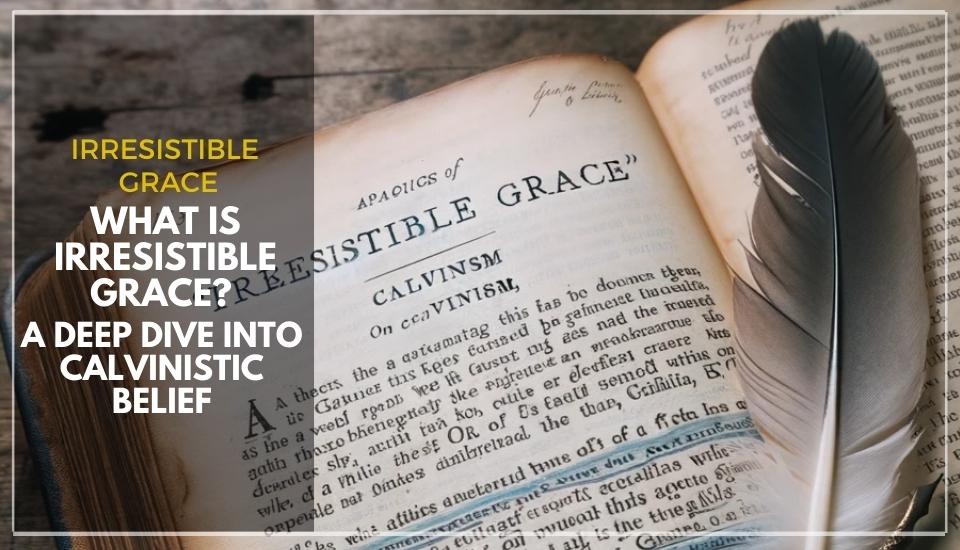Your cart is currently empty!
What is Irresistible Grace? A Deep Dive into Calvinistic Belief

What You’ll Learn
Key Takeaways
Dive into the core concepts of Irresistible Grace before exploring its deeper nuances:
- Divine Initiative: Central to the doctrine is the belief that “no one can come to me unless the father who sent me draws him,” highlighting God’s proactive role in salvation.
- Sovereign vs. Common Grace: While God’s common grace touches all, His sovereign grace ensures the salvation of the elect.
- Effectual Call: Beyond the general gospel invitation, the effectual call is God’s specific, irresistible invitation to the chosen ones.
- Theological Roots: This doctrine, deeply intertwined with the doctrine of predestination, forms the backbone of Calvinistic soteriology.
- Continued Work: God’s work of grace extends beyond salvation, guiding believers towards sanctification and eventual glorification.
What is Irresistible Grace?
Irresistible Grace is a Calvinist doctrine asserting that the saving grace of God, once extended to the elect, cannot be resisted or rejected, leading them inevitably to salvation.
Understanding the Doctrine
Irresistible Grace, while a term frequently mentioned in theological circles, requires a deep dive to truly grasp its profound implications within Calvinistic theology. It provides insight into God’s relationship with humanity and the nature of salvation. It’s one of the types of Grace theologians refer to about the subject.
Definition and Origins
Irresistible Grace is the belief that God’s saving grace, once bestowed upon the elect, becomes an overwhelming force you cannot resist. This doctrine is not an isolated concept but is rooted in the rich tapestry of Reformation theology. John Calvin, a pivotal figure of the Reformation, emphasized the absolute sovereignty of God in matters of salvation, leading to the development of the doctrine of Irresistible Grace.
Historical Context:
- Calvinism: Named after John Calvin, this branch of Protestantism has its roots in the 16th-century Reformation. Its doctrines, especially Irresistible Grace, were formulated as a response to the challenges posed by other theological perspectives of the time.
- Synod of Dort: This 17th-century gathering of Reformed theologians was crucial in crystallizing the five points of Calvinism, with Irresistible Grace being a cornerstone.
Key Points of the Doctrine
Irresistible Grace is more than just an abstract theological concept; it carries significant soteriological weight. Key aspects include:
- Inevitability of Salvation: Once God’s grace targets an individual, salvation becomes inevitable.
- Role of the Holy Spirit: The Holy Spirit plays a pivotal role in ensuring that the call to salvation is heeded, leading to regeneration and faith in Christ.
- Distinction from Common Grace: While God’s common grace is extended to all of humanity, His saving grace is reserved for the elect and is irresistibly efficacious.
Comparison with Other Doctrines
The concept of grace is not exclusive to Calvinism. Various Christian traditions have their interpretations:
- Arminianism: Advocates for prevenient grace, suggesting that God’s grace precedes human decision, allowing free will to either accept or reject salvation.
- Catholicism: Emphasizes prevenient grace but also believes that while God’s grace initiates salvation, human cooperation is essential.
- Eastern Orthodoxy: Focuses on synergy, where human free will and God’s grace work in tandem.
By contrasting Irresistible Grace with these interpretations, its unique position within Christian soteriology becomes evident.
Differentiating Aspects of Grace in Various Doctrines
| Term | Calvinism (Irresistible Grace) | Arminianism | Catholicism |
|---|---|---|---|
| Nature of Grace | Effectual, Sovereign | Prevenient, Resistible | Sufficient, Cooperated with |
| Human Involvement | Passive until regeneration | Active response required | Active cooperation with grace |
| Divine Role | God’s will is paramount; He initiates and ensures response | God provides enabling grace; response is up to individual | God offers grace; human response is essential |
| Notable Scripture Reference | “No one can come to me unless the father who sent me draws him” | “Whosoever will” | “Faith working through love” |
The Will and Irresistible Grace
Irresistible Grace does not merely stand as a theological assertion; it intricately interacts with the concept of human will, especially when examined through the lens of Calvinism. This doctrine showcases the dynamic between divine intervention and human agency.
Human Free Will in Calvinism
The interplay between free will and divine grace is a central theme in Calvinistic theology. Calvinism posits that post the Fall, human will became inherently corrupted, and individuals became “dead in our sins.” This depravity limits their ability to freely choose God without divine intervention.
Key Concepts:
- Nature of Will: In Calvinism, while individuals possess a will, it is not “free” in the libertarian sense. It’s always influenced by one’s nature, which post-Fall is sinful.
- Bondage of the Will: This concept suggests that human will is enslaved to sin, making genuine godly choices impossible without divine grace.
- Enabling Grace: Before one can respond to the call of the gospel, God’s grace must enable or “liberate” the will, aligning it with God’s purposes.
If You Want Results-Focused Consulting or an Unforgettable Speaker, Inquire About Booking Dr. Jackson Today.
How Irresistible Grace Works
The doctrine of Irresistible Grace does not imply a violation of human will but rather its transformation. When the Holy Spirit extends this special grace to an individual, it changes the disposition of their heart, making them willing and eager to come to Christ.
Stages of Divine Action:
- Outward Call: This is the general proclamation of the gospel to all people. It is an invitation, but not everyone responds affirmatively.
- Inward or Effectual Call: Exclusively for the elect, this call penetrates the heart, making it receptive to the gospel message. It ensures a positive response.
- Regeneration: Often simultaneous with the effectual call, this is the spiritual rebirth of the individual, where they are made anew and are now able to exercise faith in Christ.
The Role of the Holy Spirit in Salvation Processes
| Term | Description | Scriptural Reference |
|---|---|---|
| Spirit’s Conviction | The Holy Spirit convicts the world of sin, righteousness, and judgment | John 16:8-11 |
| Spiritual Regeneration | The Holy Spirit brings spiritual rebirth, enabling belief in Christ | Titus 3:5; John 3:5-7 |
| Spirit’s Seal | Believers are sealed by the Holy Spirit as a guarantee of their inheritance | Ephesians 1:13-14 |
The Role of God’s Sovereignty
God’s supreme authority and control over all creation, including the salvation process, is non-negotiable in Calvinism. The doctrine of Irresistible Grace accentuates this, emphasizing that God’s plans and purposes, including the salvation of the elect, cannot be thwarted by human resistance or inaction.
Considerations:
- God’s Unchanging Purpose: God’s will is immutable. When He decides to save, nothing can stay His hand.
- Human Responsibility: While God’s sovereignty is paramount, humans are still morally responsible beings. They are accountable for their actions, even as God’s sovereign will operates in the background.
- Mystery of Divine Will: The exact workings of God’s will, especially concerning predestination and human responsibility, remain a mystery. However, both truths are affirmed in Calvinism.
Irresistible Grace in Calvinism

Within the rich tapestry of Calvinistic theology, Irresistible Grace stands as a defining doctrine, intricately woven with other beliefs and teachings. To appreciate its nuances, one must place it within the broader Calvinistic context.
Calvinism and the TULIP Framework
The TULIP acronym is synonymous with Calvinistic soteriology, encapsulating its core beliefs about salvation:
- Total Depravity: Every facet of humanity is tainted by sin, making it impossible for individual sinners to seek God autonomously.
- Unconditional Election: God’s selection of certain individuals for salvation is not based on any foreseen merit or action.
- Limited Atonement: Jesus’s sacrificial death on the cross was specifically intended for the elect.
- Irresistible Grace: Once God’s saving grace is bestowed upon the elect, it becomes an indomitable force, leading them inevitably to salvation.
- Perseverance of the Saints: The elect will persist in their faith, assured of their salvation till the end.
This framework provides a systematic understanding of Calvinistic beliefs, with Irresistible Grace playing a pivotal role in the salvation narrative.
Calvinism’s Five Points and Their Significance
| TULIP Component | Relevance in Modern Christianity | Common Misunderstandings |
|---|---|---|
| Total Depravity | Highlights humanity’s need for divine intervention | Not absolute wickedness, but pervasive sin |
| Unconditional Election | God’s love and choice are not based on human merit | Doesn’t negate human responsibility |
| Limited Atonement | Emphasizes the intention and efficacy of Christ’s sacrifice | Doesn’t limit the power of Christ’s atonement |
| Irresistible Grace | Showcases God’s persistent love and the efficacy of His call | Doesn’t negate human free will |
| Perseverance of the Saints | Assurance of believers’ eternal security | Doesn’t encourage complacency in faith |
Other Aspects of Calvinistic Theology
Irresistible Grace is but one facet of the multifaceted gem that is Calvinistic theology. The doctrine rests on a foundation of interconnected beliefs:
- Sovereign Decree: Before creation, God decreed everything that would come to pass, including the salvation of the elect.
- Covenant Theology: God’s relationship with humanity is covenantal, with promises made and fulfilled across biblical history.
- Means of Grace: God uses specific means, like the preaching of the Word and the sacraments, to confer His grace upon His people.
Implications and Criticisms
Every doctrine, including Irresistible Grace, is subject to scrutiny and debate. Within the theological realm, it has both its fervent proponents and its detractors:
- Support: Proponents argue that Irresistible Grace magnifies God’s love and power, ensuring that His purposes for salvation are realized.
- Criticism: Critics often raise concerns about human autonomy and the fairness of God. If grace is irresistible for some, why is it not extended to all?
- Inter-Theological Dialogues: The doctrine has been a focal point in dialogues between Calvinists and Arminians, with both sides presenting scriptural and philosophical arguments.
Click Here to See Dr. Jackson’s Published Works and Transform How You Lead, Manage, and Succeed
Final Thoughts on Irresistible Grace
Irresistible Grace, while anchored in the academic realm of theology, has far-reaching implications, influencing personal convictions, worship practices, and the broader discourse on divine-human relationships.
The Impact of this Doctrine
The understanding and acceptance of Irresistible Grace carry profound implications for both individual believers and Christian communities:
- Assurance and Security: Embracing this doctrine provides believers with a profound sense of assurance. If they are among the elect, God’s grace ensures their salvation, offering a spiritual security that transcends life’s uncertainties.
- Evangelistic Zeal: Recognizing the potency of God’s saving grace can invigorate believers to evangelize, knowing that their efforts, undergirded by the Holy Spirit, can bear fruit.
- Worship and Adoration: A deeper appreciation of God’s grace, particularly its irresistible nature, can lead to more profound worship experiences, marked by gratitude and awe.
Continued Discourse on Calvinism
As with all theological doctrines, the conversation surrounding Irresistible Grace and Calvinism at large is ongoing, evolving with changing cultural, philosophical, and academic landscapes:
- Theological Debates: The tension between God’s sovereignty and human free will remains a hotbed for theological discussions, with Irresistible Grace often at the center.
- Cultural Relevance: In an age marked by individualism and autonomy, how does the doctrine of Irresistible Grace resonate? How can it be communicated effectively to contemporary audiences?
- Ecumenical Dialogues: The doctrine continues to be a focal point in inter-denominational discussions, fostering unity where possible and highlighting distinctive beliefs.
The Future of the Doctrine
As Christianity progresses into the future, where does Irresistible Grace stand?
- Adaptation and Reinterpretation: New generations of theologians and believers might revisit and reinterpret this doctrine, seeking to understand it in light of modern challenges and insights.
- Global Christianity: As Christianity grows in diverse global contexts, how will different cultures and traditions engage with the doctrine?
- A Timeless Truth: For many, irrespective of evolving theological landscapes, Irresistible Grace will remain a timeless truth, a testament to God’s unyielding love and power.
Grace Ambassador: Bringing Heaven To Earth
As believers, we have received unimaginable grace from the Father. Unfortunately, we often separate our spiritual life from our everyday lives. We fail to value the grace given to us, and we miss the opportunity to bring heaven to earth. Then we wonder what light we can bring to a world in deep darkness.



